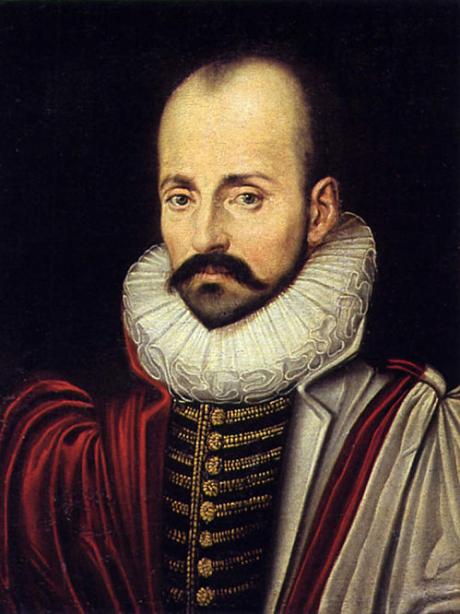به زبان فارسی
PICTORY
LATEST MUSIC
SEARCH
HISTORY OF IDEAS: Montaigne's Guide To Happiness,Wisdom and Self-Esteem (BBC Documentary)
by Darius Kadivar
08-Apr-2010
Michel Eyquem de Montaigne was one of the most influential writers of the French Renaissance, known for popularizing the essay as a literary genre which influenced both French and English literature, in thought and style.
Philosophy - A Guide To Happiness: Montaigne on Self-Esteem
Part I:
Part II:
Part III:
Michel Eyquem de Montaigne (February 28, 1533 – September 13, 1592) was one of the most influential writers of the French Renaissance, known for popularizing the essay as a literary genre. He became famous for his effortless ability to merge serious intellectual speculation with casual anecdotes and autobiography — and his massive volume Essais (translated literally as "Attempts") contains, to this day, some of the most widely influential essays ever written. Montaigne had a direct influence on writers the world over, including René Descartes, Blaise Pascal, Jean-Jacques Rousseau, Ralph Waldo Emerson, Friedrich Nietzsche, Stefan Zweig, Eric Hoffer, Isaac Asimov, and perhaps William Shakespeare (see section "Related Writers and Influence" below).
In his own time, Montaigne was admired more as a statesman than as an author. The tendency in his essays to digress into anecdotes and personal ruminations was seen as detrimental to proper style rather than as an innovation, and his declaration that, 'I am myself the matter of my book', was viewed by his contemporaries as self-indulgent. In time, however, Montaigne would be recognized as embodying, perhaps better than any other author of his time, the spirit of freely entertaining doubt which began to emerge at that time. He is most famously known for his skeptical remark, 'Que sais-je?' ('What do I know?'). Remarkably modern even to readers today, Montaigne's attempt to examine the world through the lens of the only thing he can depend on implicitly — his own judgment — makes him more accessible to modern readers than any other author of the Renaissance. Much of modern literary non-fiction has found inspiration in Montaigne and writers of all kinds continue to read him for his masterful balance of intellectual knowledge and personal story-telling.
More Here
Related Blogs:
HISTORY FORUM: The Age of Enlightment in France and Europe.
HISTORY FORUM: Nader Naderpour on Iran's Constitutional Revolution and European Rennaissance (1996)
EMPIRE OF THE MIND: The Greeks - Crucible of Civilization narrated by Liam Neeson (PBS-1999)
HISTORY FORUM: Machiavelli's "The Prince" and the "Art" of Governing
GOOD READ: All You Need to Know About The Enlightment Philosophers
| Recently by Darius Kadivar | Comments | Date |
|---|---|---|
| TOMBSTONE: Bidding Goodbye to Iranian.com (ers) | 4 | Dec 05, 2012 |
| ROYAL PREGNANCY: Prince William, Duchess of Cambridge Announce Pregnancy | 3 | Dec 04, 2012 |
| DESPERATE HOUSEWIVES: Golshifteh Farahani & Sienna Miller in Road Movie ‘Just Like a Woman » | - | Dec 03, 2012 |
RECENT COMMENTS
IRANIANS OF THE DAY
| Person | About | Day |
|---|---|---|
| نسرین ستوده: زندانی روز | Dec 04 | |
| Saeed Malekpour: Prisoner of the day | Lawyer says death sentence suspended | Dec 03 |
| Majid Tavakoli: Prisoner of the day | Iterview with mother | Dec 02 |
| احسان نراقی: جامعه شناس و نویسنده ۱۳۰۵-۱۳۹۱ | Dec 02 | |
| Nasrin Sotoudeh: Prisoner of the day | 46 days on hunger strike | Dec 01 |
| Nasrin Sotoudeh: Graffiti | In Barcelona | Nov 30 |
| گوهر عشقی: مادر ستار بهشتی | Nov 30 | |
| Abdollah Momeni: Prisoner of the day | Activist denied leave and family visits for 1.5 years | Nov 30 |
| محمد کلالی: یکی از حمله کنندگان به سفارت ایران در برلین | Nov 29 | |
| Habibollah Golparipour: Prisoner of the day | Kurdish Activist on Death Row | Nov 28 |




I loved it DK!
by benross on Thu Apr 08, 2010 04:56 PM PDT"The most terrible and violent of our flexions, is to despise our own beings."
This is quite something from someone who is guided by:
"Be wise in moderation."
... I loved it.